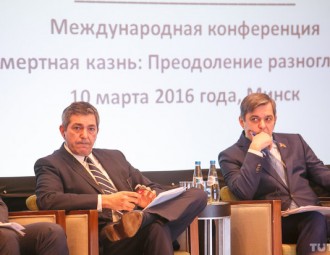Have EU sanctions impeded the death penalty moratorium?

Such opinion was voiced by Nikolai Samoseiko, the former judge, the chairman of the working group on death penalty of the House of Representatives.
All the journalists present have been asked to leave the conference “Death Penalty: Transcending the Divide” that was organized by the Ministry of Foreign Affairs together with the UN Representative Office in Minsk. Such initiative of the foreign ministry confused the professional community.
The conference in Minsk was opened by Stavros Lambrinidis, EU Special Representative for Human Rights, PACE rapporteur on Belarus Andrea Rigoni, former Czech Foreign Minister Karel Schwarzenberg, and UN Resident Coordinator/UNDP Resident Representative in Belarus Sanaka Samarasinha.
Speaking at the conference, Deputy Foreign Minister Valiantsin Rybakou claimed that a majority of the Belarusian people still support the death penalty. He cited the results of the 1996 referendum and public opinion polls.
“The majority of Belarusian citizens voted in favour of keeping the death penalty in the referendum in 1996. Repeated opinion polls, which were held in the country, suggest that the death penalty continues to be differently perceived in the society and still has a majority of supporters. This fact cannot be ignored and will not be, including in the context of the dialogue with our respected European partners,” – Belsat quotes Rybakou saying with the reference to BelTA.
In his turn, Stavros Lambrinidis, the European Union’s special representative for human rights, stressed that civilized countries should stay above revenge and abolish the death penalty.
Mr. Lambrinidis expressed puzzlement that Belarus was still applying the death penalty whereas 28 other European countries had already stopped executing prisoners. According to Mr. Lambrinidis, t he number of abolitionist countries has increased from nine in 1965 to 16 in 1978 and more than 150 in 2016.
According to Karel Schwarzenberg, a former Foreign Minister of the Czech Republic and an active supporter of the abolition of the death penalty, Minsk is ready to back down on the issue of calling a moratorium or even abolishing the death penalty.
“We know that Belarus is facing a difficult financial situation now, therefore, some progress in the field of human rights is possible,” the diplomat said.
In his opinion, the EU should have lifted its sanctions against Belarus only after our country’s introducing a moratorium on the capital.
“I’m a diehard sceptic, I would prefer some equivalent exchange – one concession in exchange for one concession. Of course, Minsk released political prisoners, but this is far from enough. It was not right to cancel all the sanctions after that move,” Schwarzenberg pointed out.
“A world without the death penalty will not be weaker, it will only improve,” said Andrea Rigoni, representative of the Council of Europe’s Parliamentary Assembly, in his speech at the conference. He also made it clear that this decision will contribute to a more productive dialogue between the official Minsk and the European Union.
“We do not want Belarus to choose between East and West. You only need to find a balance. We only want to ensure that human rights played a central role in the country,” Viasna quotes him saying. “We suggest that at least a moratorium on the death penalty should be declared in order to accelerate the dialogue between Belarus and Europe.”
Andrea Rigoni stressed that Belarus was deprived of the PACE guest status after the 1996 referendum when 80% of Belarusians voted for the retention of the capital punishment.
“We understand that Belarusian citizens support it. But I do not think this is a major obstacle to the abolition of the death penalty. It is necessary that those who control the society forced it to evolve, think and reflect. All the statistics say about the uselessness of the death penalty. It does not reduce the level of crime,” said Mr. Rigoni. “In today’s Belarus we can talk about a moratorium as an interim measure. But we have to try and stop for at least a year.”
Rigoni said that the moratorium could allow Belarus to return to the PACE as a special guest.
In response, Mikalai Samaseika, chairman of the Belarusian Parliament’s working group on the death penalty, said that this issue could not be subject to political bargaining.
“PACE should not issue ultimatums. We need to discuss this issue,” said the MP.
However, he further added that the dialogue with Europe on the issue of the death penalty was suspended in 2010 and the reason for that were the EU sanctions against Belarus.
A moratorium on the death penalty may be introduced by either Parliament or the President. But, according to Samaseika, Belarusian society is not ready for the abolition of the capital punishment.
“We can now bring the matter for discussion in the Oval Hall, but I cannot guarantee that it will be resolved positively. And it will only be a step backwards. And we cannot brush aside the public opinion that currently supports the death penalty,” said he.
Sanaka Samarasinha, UN Resident Coordinator/UNDP Resident Representative in Belarus, claimed that Belarus understands that the state should show leadership in the issues of human rights, not only in the matters related to the death penalty but all rights of a human being. “This dialogue [the conference on the death penalty in Minsk] will be a true discussion for Belarus, rather than an instruction, pressure or dictate,” the UN representative said when talking to journalists.
-
03.01
-
07.10
-
22.09
-
17.08
-
12.08
-
30.09



























